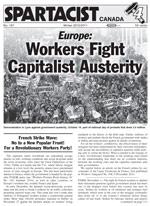
Proletarian Struggle and the Transitional Program quote of the issue The class struggles against capitalist austerity that have broken out in Europe pose sharply the question: what kind of program and leadership do the workers need to defeat the rampage of the ruling class? As the Bolshevik leader Leon Trotsky argued in the 1938 founding program of the Fourth International, it is necessary to fight for a series of transitional demands which start from the current consciousness of the working class and its daily struggles against the bosses and the government and lead to the goal of proletarian revolution. Classical Social Democracy, functioning in an epoch of progressive capitalism, divided its program into two parts independent of each other: the minimum program, which limited itself to reforms within the framework of bourgeois society, and the maximum program, which promised substitution of socialism for capitalism in the indefinite future. Between the minimum and the maximum program, no bridge existed. And indeed the Social Democracy has no need of such a bridge, since the word socialism is used only for holiday speechifying. The Comintern has set out to follow the path of the Social Democracy in an epoch of decaying capitalism: when, in general, there can be no discussion of systematic social reforms and the raising of the masses’ living standards; when the bourgeoisie always takes away with the right hand twice what it grants with the left (taxes, tariffs, inflation, “deflation,” high prices, unemployment, police supervision of strikes); when every serious demand of the proletariat, and even every serious demand of the petty bourgeoisie, inevitably reaches beyond the limits of capitalist property relations and of the bourgeois state. The strategic task of the Fourth International lies not in reforming capitalism but in its overthrow. Its political aim is the conquest of power by the proletariat for the purpose of expropriating the bourgeoisie. However, the achievement of this strategic task is unthinkable without the most considered attention to all, even small and partial, questions of tactics. All sections of the proletariat—all its layers, occupations, and groups—should be drawn into the revolutionary movement. The present epoch is distinguished not because it frees the revolutionary party from day-to-day work but because it permits this work to be carried on indissolubly with the actual tasks of the revolution. The Fourth International does not discard the program of the old “minimal” demands to the degree to which these have preserved at least part of their vital forcefulness. Indefatigably, it defends the democratic rights and social conquests of the workers. But it carries on this day-to-day work within the framework of the correct actual, that is, revolutionary, perspective. Insofar as the old partial, “minimal” demands of the masses clash with the destructive and degrading tendencies of decadent capitalism—and this occurs at each step—the Fourth International advances a system of transitional demands, the essence of which is contained in the fact that ever more openly and decisively they will be directed against the very foundations of the bourgeois regime. The old “minimal program” is superseded by the transitional program, the task of which lies in systematic mobilization of the masses for the proletarian revolution…. The question is one of guarding the proletariat from decay, demoralization, and ruin. The question is one of life or death of the only creative and progressive class, and by that token of the future of mankind. If capitalism is incapable of satisfying the demands inevitably arising from the calamities generated by itself, then let it perish. “Realizability” or “unrealizability” is in the given instance a question of the relationship of forces, which can be decided only by the struggle. By means of this struggle, no matter what its immediate practical successes may be, the workers will best come to understand the necessity of liquidating capitalist slavery. —Leon Trotsky, “The Death Agony of Capitalism and the Tasks of the Fourth International” (1938) |
|
||||||||||||||||||||||||||||||||||||||||||||||||
